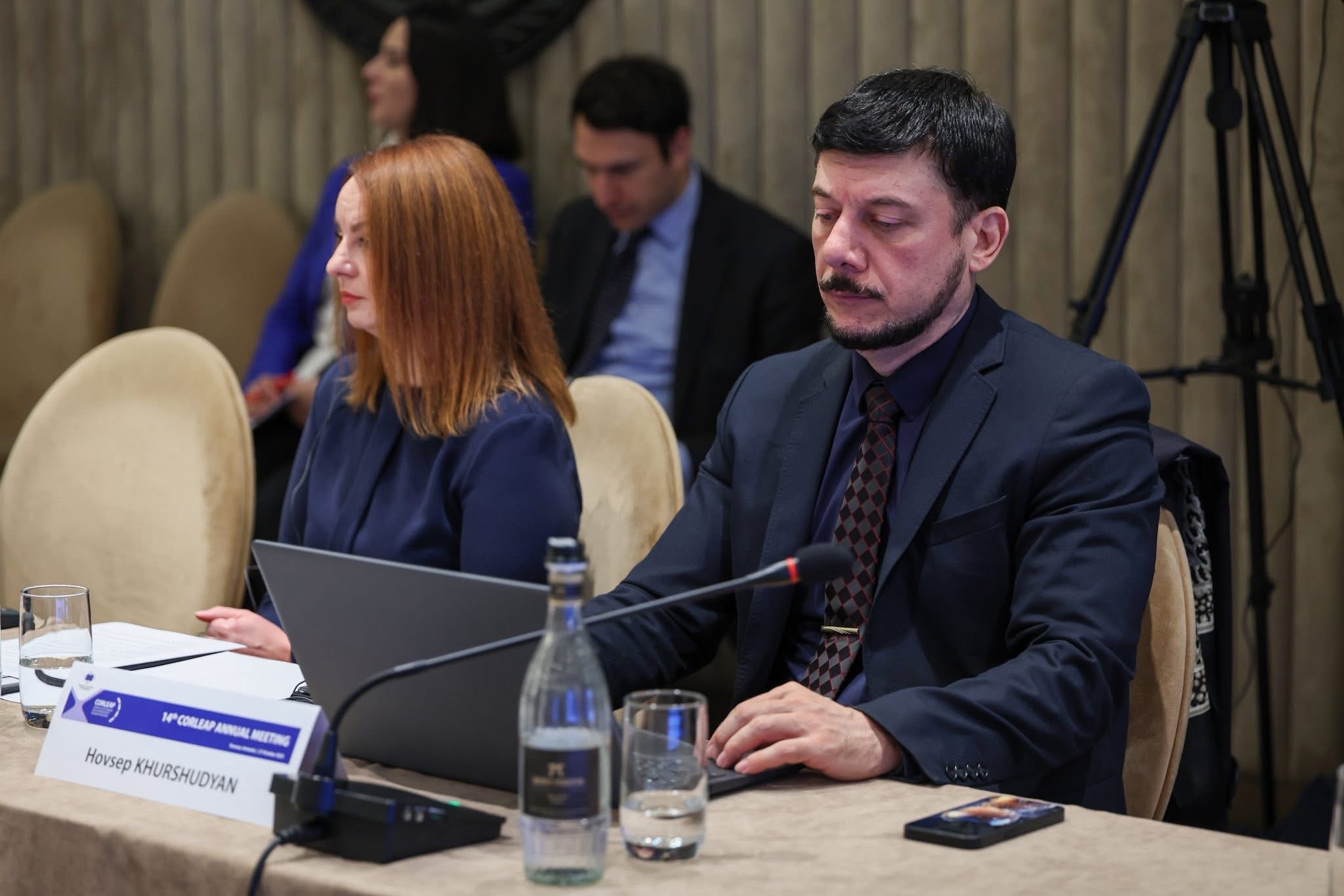Hovsep Khurshudyan, member of the EaP CSF Steering Committee, together with Andrea Raimondi, Director of the EaP CSF Secretariat, participated in the 14th annual meeting of the Conference of Regional and Local Authorities for the Eastern Partnership (CORLEAP), which took place this time in Yerevan. On behalf of the EaP Civil Society Forum Steering Committee, Hovsep Khurshudyan delivered a speech, the full text of which is presented below.
Dear colleagues!
For the last years, we have met in a context where a long-standing and catastrophic war unleashed by Russia is raging on the territory of the Eastern Partnership. For the same years, another war was unleashed by Azerbaijan in Nagorno-Karabakh. These wars claim hundreds of thousands of lives and force us, in addition to our traditional tasks and priorities, to also consider the security of Europe, especially its eastern part and its communities. But at stake is not only our security, but also the future of European democracy. Russia and its allied autocracies are sparing no means to use hybrid warfare to destroy democracy, human and peoples’ rights, freedoms, and all the values that unite us and are fatal to any autocracy.
This hybrid war has even reached the communities. And today, as we discuss the importance of decentralization of power and budget-forming financial flows for European countries, since Europe is, first and foremost, communities, we must also consider that the resurgent Evil Empire to the east of Europe, through its proxies not only in the Eastern Partnership countries but even in EU member states, skillfully exploits the opportunities offered by democracy to destroy democracies, exploits human rights to ensure the immunity of its agents of influence and puppets, and exploits freedom of speech to establish subservient autocracies.
Citing Armenia, which is preparing for parliamentary elections next June, let me inform you that the criminal oligarchy, ousted by the velvet, non-violent democratic revolution of 2018, has been seeking revenge in recent years, with the support of the Kremlin, establishing its control over Armenian communities one after another. And when law enforcement agencies hold criminal community leaders accountable for corruption, political forces and media outlets serving the Kremlin’s interests publicly and globally declare them political prisoners or persecuted for political reasons. Vanadzor, Gyumri, Masis: the list could go on. Of course, it’s sad that even after the Velvet Revolution, the majority of voters in some communities still cast their ballots for criminal elements. Here, I believe, we, civil societies, have a great deal of work to do. In this regard, the experience of democratic transition in Eastern European countries would be very useful.
Dear colleagues!
In the Eastern Partnership region, there are numerous towns and villages whose populations were forcibly displaced as a result of illegal military aggression. And I’m not only talking about Ukraine, but also about Azerbaijan and Nagorno-Karabakh. Martuni, Martakert, Askeran, Hadrut, Shushi, as well as hundreds of villages and the capital of Nagorno-Karabakh, Stepanakert, have been depopulated. Their properties have been abandoned, often looted. The names of settlements have been changed to Azerbaijani ones without the consent of the residents.
On August 8, 2025, a peace treaty between Armenia and Azerbaijan was initialed in Washington, D.C., brokered by the President of the United States. This is a welcome development. However, lasting peace cannot be achieved at the cost of ethnic cleansing and the violation of the rights of thousands of people as well as crimes and threats. In the face of the repeated Azerbaijani aggression against the Republic of Armenia between 2020 and 2022, and under constant threat of war voiced by the Azerbaijani leader, the Armenian government was forced to remain silent about the rights of 150,000 residents forcibly displaced from Nagorno-Karabakh. But Aliev’s dictatorial regime cannot silence the civil society and its Eastern Partnership Forum.
Armenia’s history was and is significantly shaped by the Nagorno-Karabakh conflict, which has deeply influenced its human security policies. This conflict and its aftermath have required the country to develop expertise in different areas, such as managing displaced populations, ensuring basic human rights, and maintaining civil stability. Civil society has also been working actively in this sphere, for example, providing shelter, food security, and psychological support.
A stronger regional cooperation in the field of security, including a human security approach, can contribute to democratization and economic development at the national and regional levels.
Developing a human security approach in the Eastern Partnership policy will be relevant not only to Armenia but to all neighbors that have active or protracted conflicts on their territory.
It is the case of Ukraine, where civil society groups have played a key role in the country’s defense against Russia through their rapid mobilization across multiple domains.
To conclude, I have three appeals to our European colleagues:
First. Reach out to the people of your communities and convince them to increase their support for Ukraine. Today, it is the resilient and freedom-loving people of Ukraine and their heroic soldiers who are largely saving democracy and freedom in Europe, and it seems, throughout the world.
Second: Reach out to the residents of your communities and convince them to support the young democracies of Moldova and Armenia, as well as the freedom-loving people of Georgia, in their fight against the hybrid war unleashed against them by the Kremlin through its proxies in these countries. In this context, I see it as critical to deepen cooperation between the communities of the EU member states on one side and the communities of the Eastern Partnership five countries on the other.
Third: Reach out to the residents of your communities and convince them to raise their voices, demonstrating their political support for the ethnically cleansed Armenian people of Nagorno-Karabakh, so that they can return and live safely in their cities and villages.
Thank you for your attention

